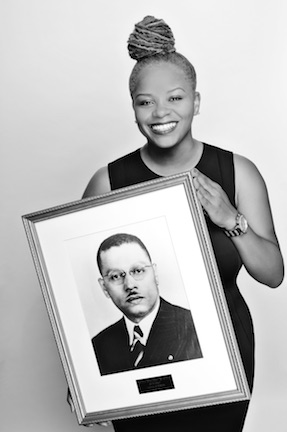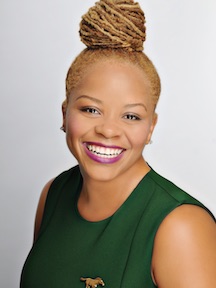By Bailey DeSimone
Although the first women were not inducted into Phi Beta Kappa until 1875, nearly a century after the Society’s founding, the women of Phi Beta Kappa are today advocating openly and successfully on behalf of the liberal arts and sciences.
Crystal deGregory, the director of the Atwood Institute for Race, Education, and the Democratic Ideal and an associate professor in the history department of Kentucky State University, draws upon the values of her own liberal arts education in order to promote the values of multiculturalism and diversity through her work.
Originally from the Bahamas, deGregory enrolled at Fisk University in 1999. A historically black university and Nashville’s oldest higher education institution, Fisk has been home to the Delta of Tennessee Chapter of Phi Beta Kappa since 1953.
“At Fisk, I had the good fortune of having our core curriculum being delivered within the context of African-American heritage, and so I found myself intrigued, through my English courses, and wanting to learn more about all of the stories, people, and personalities, that I was introduced to in passing,” deGregory said.
She graduated Phi Beta Kappa from Fisk in 2003.
“I had the distinct privilege to be inducted [into Phi Beta Kappa] along with Nikki Giovanni,” recalled deGregory, who described herself as a “historian by way of passion and profession.”
“I don’t think it’s happenstance that I am a historian,” deGregory said. “I remember from the time that I was a child, always being fascinated with the stories of people from the past and also from the present. When I got to college, being a first-generation college student, I really did not have an awareness of all of the occupational possibilities or those of majors within the college experience. I just simply did not know that one could be an expert in any field.”
“Being a history major provided me with the license to understand, more deeply, the value of a liberal arts education,” deGregory reflected.
In addition to completing her degree in history, she volunteered in the John Hope and Aurelia Franklin Special Collections Library on Fisk University’s campus. The library setting became an opportunity to interact not only with hundreds of years’ worth of primary resources and holdings, but also with the world-class researchers who visited the library in order to conduct their research.
“The combination of my in-class experiences and special collections exposure, amid a committed, supportive, and courageous environment paired with a rigorous curriculum, really supported my interests,” deGregory continued.
Many of her current projects as the inaugural director of the Atwood Institute focus on the legacies of Historically Black Colleges and Universities and their campus cultures.
“As an educational historian, my work on the histories of HBCUs persists as well as other facets of campus life and culture, including black Greek-lettered fraternities and sororities. I also have the great fortune of being able to continue my research on black Caribbean history and Bahamian history,” deGregory said.
The mission of the Atwood Institute carries tremendous implications for social progress through honoring diversity, dismantling negative stereotypes, and training new generations of leaders.
“Of course, given that we have the umbrellas of race, education, and specifically, the democratic ideal (which is different from democracy), we talk about subject matter across all three of those fields,” deGregory clarified. “[The Institute is] the intersection of all things race, education, and democracy.”
“I firmly believe, given the historic mission of HBCUs, that education is a right and a responsibility to leave the world a better place than we met it, and that multiculturalism and diversity are not mere accessories to education,” deGregory asserted. “They ought to be centerpieces of our personal and professional convictions, forging the creation of the kind of world that we all deserve, regardless of one’s race, gender, class or religious beliefs, sexual orientation or the differences in our physical abilities.”
When asked about ensuring openness to diversity in a higher education setting, deGregory advised students and teachers alike to “prepare to be uncomfortable.”
“Diversity is not about a colorless, genderless, religion-less world,” deGregory said. “It is about the fundamental commitment to realize that every human life has dignity and value, and that it is our responsibility to recognize that value despite the many ways in which we are indeed different. Difference is not deficiency.”
In the spirit of Phi Beta Kappa’s promotion of lifelong learning, deGregory certainly embodies a passion for learning throughout all of life.
“I have sought to be an eternal teacher and an eternal student,” she said. “I never stop teaching, and I never stop learning. I hope to learn as much from my students as they learn from me. It is a continual process of reciprocity, an exchange of ideas and ideals, and a sharing of exposures and experience, and those are things that both students and teachers have to work very hard at keeping in balance and keeping in motion as we live in a world that is very fast-paced, and constantly in flux. We have to be flexible and responsive to the needs of our students and to the constantly changing constructs of what education is, what it looks like, and what purposes it serves.”
“The liberal arts should be protected by all means,” deGregory attested. “We could talk endlessly about the fact that we are important, that the liberal arts are valuable, and that its contributions are relevant; but the most effective way to convince people of those truths is to live out those qualities, to exhibit that value, to model for others the inherent value of all that the liberal arts has to offer, both personally and collectively.”
Currently, deGregory is leading the Kentucky State campus’ celebration of Atwood Day in commemoration of Rufus B. Atwood, the namesake of the Institute, on March 27. In addition to planning and oversight for Atwood’s programming, she is developing the syllabus for her fall History of African Americans in Higher Education course. She is also responsible for the publication of The Journal of HBCU Research + Culture, of which she is the founding editor. The journal has forthcoming articles about a number of subjects including HBCUs in the Age of Trump, black women HBCU presidents, and the legacy of Martin Luther King, Jr. She is also conducting a digital humanities project about Kentucky State University’s more than 131-year history.

Crystal deGregory holding a portrait of Rufus B. Atwood.
Bailey DeSimone (ΦBK, University of North Carolina at Chapel Hill, 2017) is an Archives Intern with the Smithsonian Center for Folklife and Cultural Heritage and a Library Assistant with the Council on Foreign Relations. At Chapel Hill, DeSimone majored in history and global studies. The University of North Carolina at Chapel Hill is home to the Alpha of North Carolina Chapter of Phi Beta Kappa.




